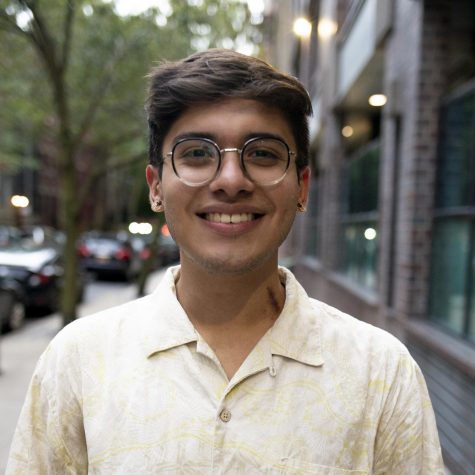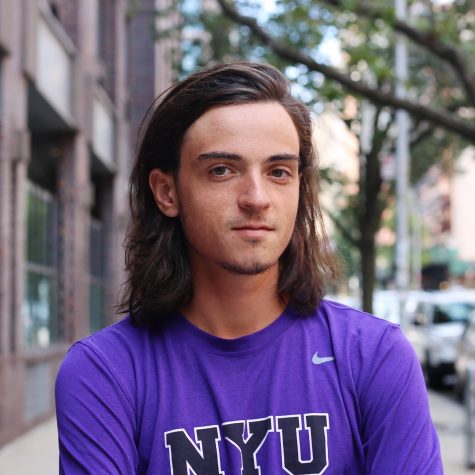Jaboukie Young-White Lights up Kimmel With Laughter
On and off stage, Jaboukie Young-White turns out to be just the hip and conscientious artist his fans thought he was.
October 1, 2018

Young-White is well-known as a comedian and Twitter personality.
The 10th floor of the Kimmel Center for University Life was aglow with laughter Thursday night as student-performers and Jaboukie Young-White hit the stage to do stand-up in front of hundreds of students and fans.
In an impromptu interview with Young-White post-performance, behind the fading din of followers running around the first floor of Kimmel wondering where he disappeared to, I spent quality time with the 24-year-old comedian and talk about his art and how he feels about people who don’t date anyone under 6 feet tall.
When told that he was a celebrity, Young-White begged to differ.
“I’m not regularly around people who I met after blowing up,” he said. And most of the friends that I have now are people who I’ve been friends with since I was homeless.”
The latter part was jarring and almost sounded like an exaggeration. But he was open about his experiences as a nascent comedian.
“Summers, I would stay in [Chicago] because I didn’t want to go back home. A lot of the summers I would just be couch surfing the entire [time]. And then when I moved to New York, I moved here with [$1,000] and blew through it so fast. I was like, ‘That’ll get me an apartment, that’ll get me set up,’ and then I was just staying with friends that I had met in either college or high school,” Young-White said. “I was 22. I’m just now starting to do a lot longer sets. When I first started doing open mics and I just needed stuff that was punch, punch, punch, I had like three minutes to perform.”

The audience, comprised of both NYU students and the public, laugh at Young-White’s performance.
Anyone who scrolls through Young-White’s Twitter feed or watches the shows he writes for — “Big Mouth” and “American Vandal” — knows that he has a flair for dark comedy that makes you question bigger social constructs, while tears stream down your face from laughing so hard. He said that he’s wary of comedy that’s too dark, though.
“It’s like I never want to get too dark just because I have to pull people back from that. I don’t want to drop something insanely dark and then have [an audience] follow that.”
It seems like a lot of Young-White’s content is inspired from much more delicate and serious aspects of life, especially for a person of marginalized identities.
“Clearly for people of color it’s difficult for us to find stable housing a lot of the time. And I’m very lucky to be extremely light-skinned and straight-passing. Even with that, there were times that were still hard. I feel like because I spent so much time being the butt of the joke, I am always very mindful of ‘Who is this directed at?’ or ‘What is this directed at?’ I just want to be punchy and go in new directions.”
Young-White expressed a different side of himself during our time together. One that’s immediately more profound than the side that loves to tweet about curry and “short kings” — although those things merit attention as well. Social media works well with Young-White’s self-described punchy comedy. It delivers instantly, but you still dwell on it long after you’ve closed the app. Young-White actually had a lot to say about the social constructs that uphold height as a marker of beauty.
“Short kings all day. It is body-shaming [short guys],” Young-White said. “And it also falls disproportionately on trans men. To say that someone has to be a certain height to truly be a man erases them.”
Young-White’s socially responsible comedy is a different approach to conversing about important topics, things that have the potential to affect the way people can live their lives.
“I think we’re in an interesting point where people are able to understand the complexities of people’s identities. I think we’re moving past the point of everyone having a turn at things. Like, now it’s time for people of color, then it’s time for women, then it’s time for women of color. We’re just getting to the point where maybe we could just open [conversations] to everyone. And just embrace people for the complex beings we all are. And understand that none of us are just existing as one identity. We all contain multitudes.”

Charlie Bardey, who often does shows in the New York City area, performs.
Enamored of this response, I wanted to dig deeper into Jaboukie Young-White as a role model, instead of just the short, brown, millennial comedian that tweets about being gay and writes content for dark TV shows on par with programs like “Family Guy” and “BoJack Horseman.” When I asked him how he felt about being called a role model, he calmly explained that whether he likes it or not, it’s simply out of his control.
“Once you become a public figure, you cease to be human to a lot of people,” he said. “You become a consumable object. I try to move and do things in a way that I would be proud of. And if people also tend to align with that, then that’s awesome.”
When asked about her love and appreciation of Young-White’s comedy, GLS sophomore Zoe Vongtau corroborated that the impact of his comedy has something to do with his identity.
“I think his personality and his identity on Twitter add a lot to his comedy and I really like that,” Vongtau said. “He’s honest about his feelings and how his identity goes into his work. He tweets about political sh-t, but it’s still funny. He was tweeting about curry the other day. There were several tweets that were just an ode to curry. It sums up how intelligent and hilarious and adventurous he is as a comedian.”
I was surprised and pleased to hear performers and onlookers alike acknowledging comedy as a way to uplift others. It seems easy to write off an art form like stand-up as something we only see on TV, performed by trashy people making trashy jokes. But visiting comic Charlie Bardey lightheartedly summed up the power of comedy as the night’s festivities came to an end.
“I like attention. I like making people laugh, that feels so good. I feel like it’s a form that can be wide open you can do so much with it. I think it’s the most pure way to make people laugh. At its core, you’re [just] talking to people.”
Email Alejandro Villa Vásquez at [email protected].

























































































































































